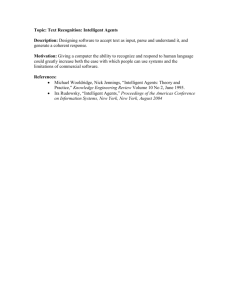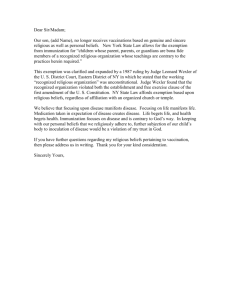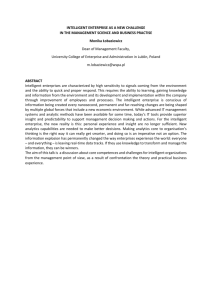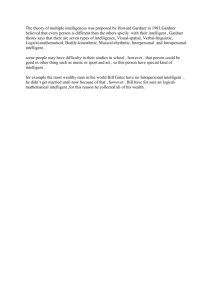Document 11102934
advertisement
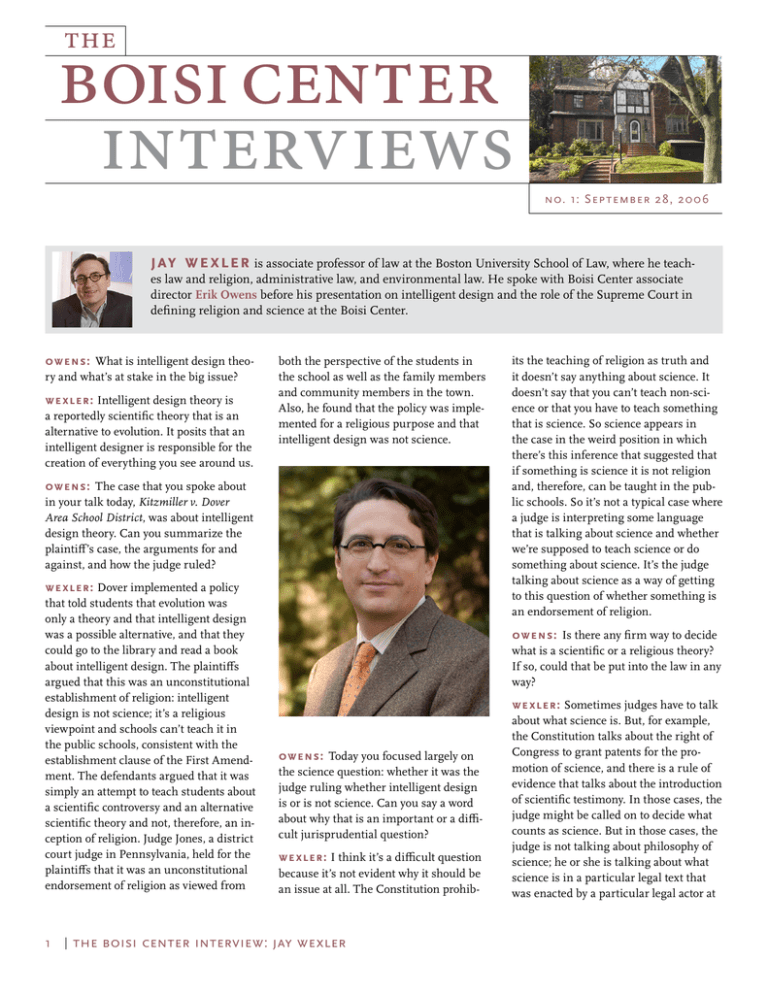
the boisi center interviews no. 1: Sep tember 28, 20 06 jay wexler is associate professor of law at the Boston University School of Law, where he teaches law and religion, administrative law, and environmental law. He spoke with Boisi Center associate director Erik Owens before his presentation on intelligent design and the role of the Supreme Court in defining religion and science at the Boisi Center. owens: What is intelligent design theory and what’s at stake in the big issue? wexler: Intelligent design theory is a reportedly scientific theory that is an alternative to evolution. It posits that an intelligent designer is responsible for the creation of everything you see around us. both the perspective of the students in the school as well as the family members and community members in the town. Also, he found that the policy was implemented for a religious purpose and that intelligent design was not science. owens: The case that you spoke about in your talk today, Kitzmiller v. Dover Area School District, was about intelligent design theory. Can you summarize the plaintiff’s case, the arguments for and against, and how the judge ruled? wexler: Dover implemented a policy that told students that evolution was only a theory and that intelligent design was a possible alternative, and that they could go to the library and read a book about intelligent design. The plaintiffs argued that this was an unconstitutional establishment of religion: intelligent design is not science; it’s a religious viewpoint and schools can’t teach it in the public schools, consistent with the establishment clause of the First Amendment. The defendants argued that it was simply an attempt to teach students about a scientific controversy and an alternative scientific theory and not, therefore, an inception of religion. Judge Jones, a district court judge in Pennsylvania, held for the plaintiffs that it was an unconstitutional endorsement of religion as viewed from 1 its the teaching of religion as truth and it doesn’t say anything about science. It doesn’t say that you can’t teach non-science or that you have to teach something that is science. So science appears in the case in the weird position in which there’s this inference that suggested that if something is science it is not religion and, therefore, can be taught in the public schools. So it’s not a typical case where a judge is interpreting some language that is talking about science and whether we’re supposed to teach science or do something about science. It’s the judge talking about science as a way of getting to this question of whether something is an endorsement of religion. owens: Is there any firm way to decide what is a scientific or a religious theory? If so, could that be put into the law in any way? owens: Today you focused largely on the science question: whether it was the judge ruling whether intelligent design is or is not science. Can you say a word about why that is an important or a difficult jurisprudential question? wexler: I think it’s a difficult question because it’s not evident why it should be an issue at all. The Constitution prohib- the boisi center interview: jay wexler wexler: Sometimes judges have to talk about what science is. But, for example, the Constitution talks about the right of Congress to grant patents for the promotion of science, and there is a rule of evidence that talks about the introduction of scientific testimony. In those cases, the judge might be called on to decide what counts as science. But in those cases, the judge is not talking about philosophy of science; he or she is talking about what science is in a particular legal text that was enacted by a particular legal actor at some time under some circumstances to achieve a certain purpose. That’s the kind of thing judges do all the time: they decide what statutory language means or what constitutional language means. owens: Is that the case with religion as well? wexler: Yes, because the First Amendment, for better or worse, prohibits the establishment of religion or the prohibition of free exercise. So there are times when the judges have to think about what counts as religion because the Constitution requires them to do so. But there’s no such requirement that they consider what science is. owens: You’re suggesting that Judge Jones has jumped the fence in speculating about the nature of science. Is there an analogous jumping of fences in questions of religion as well—someone who has speculated about the nature of religion outside the First Amendment, for example? Or is it so uniquely related to the First Amendment that the question is always tethered to it? wexler: To my knowledge, there’s no analogy in questions of religion. It’s related either to the First Amendment or to some statutes that talk about the protection of religion: the Religious Freedom Restoration Act, Title 7 of the Civil Rights Act about employment discrimination against religion. Religion pops up here and there, and there are some big cases from a long time ago about the draft exemption statutes in which courts were called on to talk about what religion meant. But in all these cases, it’s the judge interpreting the word religion or religious in a statute, a constitutional provision. Even in those cases, the courts are really reluctant to say what religion is. They’re notorious for avoiding the subject as much as they can. owens: Have there been any other court precedents, either federal or at the Supreme Court level, where someone has speculated about the nature of science? 2 wexler: A district court case from 1981, owens: Do you buy into the term? If so, McLean v. Arkansas Board of Education, also involved creation science; the judge, Judge Overton, tried to define what science means. And you could read some of the Supreme Court or other courts’ decisions to address philosophy of science, or you could argue that it’s not really what they’re talking about. But generally, no. it seems you might be suggesting this is an activist judge, given your critique of his statement on science. owens: Judge Jones wrote in his opinion that this is manifestly not an activist court. Why was he so defensive and what’s at stake in that charge? “[Sometimes] the judges have to think about what counts as religion because the Constitution requires them to do so. But there’s no such requirement that they consider what science is.” wexler: I will not use the word activism. I am critical of the judge for deciding the science issue when I think it was unnecessary. As to activism generally, I think it’s hard to talk about in the abstract. You have to talk about exactly what you mean by activism. owens: One of the rallying cries of intelligent design supporters and in Dover has been that we “teach the controversy” about intelligent design. What do you make of this argument? wexler: It’s obviously an appeal to liberal education. Our goal is to teach students about all different kinds of things and have them use their critical faculties to make their own decisions. This has an appeal to it, certainly, and in a sense, it’s right. The school should teach about the controversy. But they shouldn’t present intelligent design as a possibly valid scientific theory unless or until it qualifies as such in the scientific literature. owens: In our discussion today, several people brought up the concern about whether or not your critique of this decision meant that teachers wouldn’t be able legally to teach intelligent design. Is that what you’re suggesting, and if not, how teachers might approach this topic in public schools today? wexler: I think the way to do it would wexler: Somehow judicial activism has become a label for judges going beyond their proper role and reaching to decide questions that they shouldn’t decide and to overrule the judgment of the political branches. It’s a buzz word for “bad judge.” Nobody talks about good activism, right? Clearly he was concerned that he would be labeled in that way, but it would be hard to say whether he successfully defends himself from the charge. the boisi center interview: jay wexler be to teach about it in social science or comparative religion classes, or maybe even philosophy of science classes, if it’s done right. Schools should teach about religion, and the controversy over intelligent design might be part of that. What they shouldn’t do is introduce it in a science classroom as a possibly valid scientific theory. owens: What’s next for the intelligent design movement? Has this ended the litigation train? owens: I don’t know. It might depend on whether Congress passes a bill that would limit shifting of attorneys’ fees and establishment clause victories. Part of the reason you don’t see many of these cases is that according to federal law, if the school board loses, they have to pay a million dollars in legal fees to the other side, since the other side has probably hired people from big law firms. So there’s a great disincentive for schools to experiment in this area. The next chapter could be simply arguments against evolution, not a positive theory of design but teaching students about the holes in Darwinian theory and places where things aren’t certain as a way of kind of introducing doubt into the area. [end] The Boisi Center for Religion and American Public Life Boston College 2 4 Quinc y Road Chestnut Hill, MA 02 467 tel 617 - 55 2-1860 f a x 617 - 55 2-1863 publife@b c .e du Visit bc .e du/boisi-resources for a complete set of the Boisi Center Inter views and audio, video, photographs, and transcripts from our events. 3 the boisi center interview: jay wexler b oisicenter @b oisi _ center
